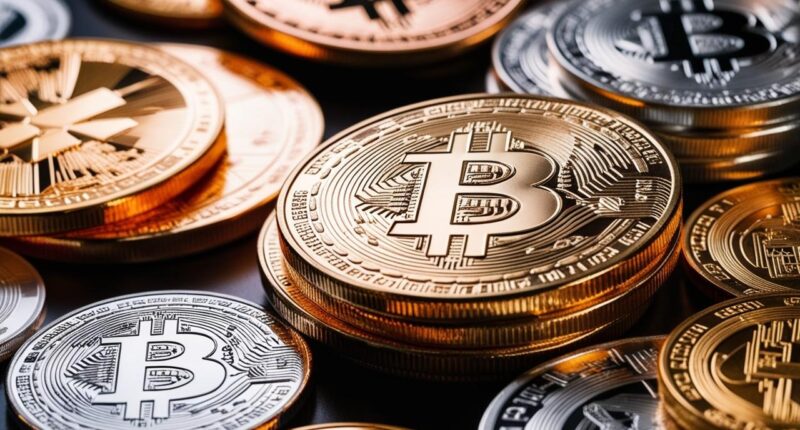Crypto coins and tokens serve distinct roles in the cryptocurrency ecosystem. Coins operate on their own blockchains and are primarily used for transactions and value transfer. In contrast, tokens are built on existing blockchains, often using smart contracts, and represent various assets or utilities. While coins typically have larger market capitalizations, tokens can offer governance rights and platform functionalities. Understanding these differences is essential for grasping the broader cryptocurrency landscape, where more details await your exploration.
In the evolving landscape of digital finance, understanding the distinction between crypto coins and tokens is essential for anyone interested in cryptocurrency. Coins are digital currencies that operate on their own independent blockchains. They are designed primarily for payments and value transfer, functioning as currency in various transactions.
In contrast, tokens are built on existing blockchains and can represent a range of assets or utilities, such as access to a platform or governance rights within a network. Cryptocurrencies run on a distributed public ledger called blockchain, which is a key element that underpins both coins and tokens. Additionally, the rise of decentralized finance (DeFi) has further highlighted the diverse functionalities and applications of tokens in this new financial ecosystem.
The technical differences between coins and tokens are significant. Coins require their own network nodes and are typically mined or staked, while tokens are created through smart contracts on already established blockchains. This distinction makes the creation process for tokens generally easier and less resource-intensive than for coins, which often necessitate the development of a new blockchain. Tokens can exist on multiple blockchains, making them more versatile compared to native assets.
Coins are often launched through initial coin offerings (ICOs), whereas tokens frequently adhere to standardized protocols, such as ERC-20.
Use cases further differentiate coins from tokens. Coins are primarily utilized for payments and serve as a store of value, while tokens can be used for various functions on specific platforms, including governance, utilities, and securities. Both types of digital assets are commonly found in decentralized finance (DeFi) applications.
Market characteristics also highlight these differences. Coins typically have larger market capitalizations and are traded on all major exchanges. Tokens, however, are more numerous and often found on specialized or decentralized exchanges. Both coins and tokens are subject to high volatility in the market.
Regulatory considerations can vary as well. Coins are often treated as commodities, with regulations focusing on money transmission. Tokens, on the other hand, may be classified as securities, leading to regulations that examine their utility and function.
As the global regulatory landscape continues to evolve, understanding these distinctions becomes increasingly important for anyone engaging with cryptocurrency.
Frequently Asked Questions
Can Tokens Be Converted Into Crypto Coins?
Tokens can indeed be converted into crypto coins through various methods. This process usually involves selling the tokens on an exchange and purchasing coins.
Some platforms allow direct swaps between tokens and coins. It is crucial to evaluate factors such as market prices, conversion rates, and potential gas fees.
Additionally, compatibility between the blockchains of the token and coin is essential for a successful conversion. Overall, users have multiple platforms to facilitate these exchanges.
Are All Crypto Coins Decentralized?
Not all cryptocurrency coins are decentralized. The degree of decentralization varies, influenced by factors such as the distribution of nodes, mining or staking power, and governance models.
Some coins, like Bitcoin, are highly decentralized, while others, such as Ripple (XRP) and Binance Coin (BNB), exhibit centralization due to control by a small group or entity.
Understanding these characteristics is essential for evaluating the security and reliability of different cryptocurrencies.
How Are Crypto Coins Mined?
Crypto coins are mined through a process where miners use powerful computers to solve complex mathematical puzzles. This validation adds new transactions to the blockchain.
Miners compete to find the correct hash, using specialized equipment like ASICs or GPUs. Successful miners receive newly minted coins as rewards.
The mining process relies on a consensus mechanism called Proof of Work, which requires significant energy and guarantees network security by preventing double-spending.
Can Tokens Have Real-World Applications?
Tokens can indeed have real-world applications across various sectors. Utility tokens provide access to services and governance in decentralized platforms, while security tokens represent ownership of real-world assets, ensuring compliance with regulations.
Non-fungible tokens (NFTs) authenticate unique digital items, and real-world asset tokens facilitate trading of commodities.
These applications enhance efficiency, improve liquidity, and enable innovative solutions in finance, art, and supply chain management, demonstrating the versatility of tokens in practical scenarios.
What Is the Role of Smart Contracts in Tokens?
Smart contracts play an essential role in the creation and management of tokens. They automate the generation and distribution of tokens, defining attributes like supply and transfer rules.
Smart contracts also guarantee compliance with established token standards, such as ERC-20 and ERC-721. Additionally, they manage token ownership records on the blockchain, enabling functionalities like minting, burning, and enforcing access controls.
This automation facilitates secure and efficient interactions within decentralized applications and token ecosystems.
References
- https://usa.kaspersky.com/resource-center/definitions/what-is-cryptocurrency
- https://www.youtube.com/watch?v=T3FG-rkfww4
- https://brave.com/web3/cryptocurrency-versus-tokens/
- https://www.investopedia.com/terms/c/cryptocurrency.asp
- https://www.berghahnbooks.com/downloads/OpenAccess/ShapiroCrypto/9781805392934.epub
- https://www.bitpay.com/blog/coins-vs-tokens
- https://en.wikipedia.org/wiki/Cryptocurrency
- https://www.fdic.gov/system/files/2024-06/2020-request-for-info-standard-setting-3064-za18-c-031.pdf
- https://en.bots.io/nieuws/crypto-coin-vs-token-difference/
- https://www.nerdwallet.com/article/investing/cryptocurrency









